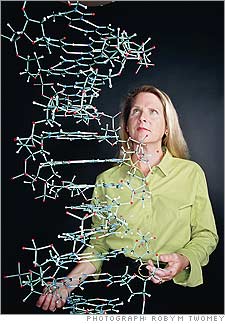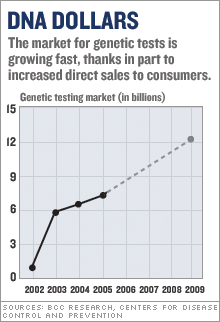|
The gene screen Diagnosis: Advances in the field of genomics are creating new tests for diseases and drug reactions. Prescription: Online DNA-testing services.
(Business 2.0 Magazine) -- This summer retired computer consultant Carleton Neville went online, took out his credit card, and ordered a $500 colon cancer test from DNA Direct, a San Francisco genetic-testing service. A few weeks later, he logged back on, read his laboratory report, and scheduled a time to discuss his clean bill of health with a counselor. "I would rather do this than have a colonoscopy," says the 65-year-old resident of Orlando, Fla.
Who wouldn't? DNA Direct is just one of more than two dozen online genetic-testing services springing up to take advantage of advances in genomics--and the growing willingness of consumers to conduct even their most personal business over the Internet. Launched last year, DNA Direct is about to close a second $3 million round of financing. The attraction for investors? Virtually every week a new genetic test pops up for a different disease. Tests for nearly 1,300 ailments have been developed so far, with 1,000 now available. Getting one is easy--it just takes a few mouse clicks before a home test kit arrives in the mail. Many involve simply taking a swab from the inside of a person's cheek and mailing it to a lab for analysis. Health care comes home That's just the beginning. Analysts estimate that by 2009 the genetic-testing market will be worth a whopping $12.5 billion annually. And with the advent of tests that will help tailor medication to an individual's genetic profile--a field called pharmacogenetics--the market is poised to take off. "One-size-fits-all medicine will soon be passé," says DNA Direct founder and chief executive Ryan Phelan, a serial entrepreneur whose company currently sells genetic tests priced between $200 and $3,300 that tell consumers if they are predisposed to breast cancer or perhaps carry the gene for cystic fibrosis. "We're finally at the point where consumers can get access to personalized medicine." DNA Direct, capitalizing on the pharmacogenetics trend, has set up a new site, Genesanddrugs.com, and will start selling $500 tests this fall that reveal how people will respond to various prescribed medications, including antidepressants, pain relievers, and tamoxifen, a breast cancer drug with potentially dangerous side effects. Free from side effects More than 30 percent of drugs don't work the way they are intended, and bad drug reactions result in 2 million hospitalizations and as many as 100,000 deaths annually, according to the U.S. Food and Drug Administration. Mayo Clinic offers a test that helps physicians identify patients who will likely suffer side effects from antidepressants. Roche Diagnostics, too, has developed a pharmacogenetic test for antidepressant side effects, and sales of such tests are expected to reach $1 billion within a few years. Last year Mayo introduced a pharmacogenetic test that indicates whether a patient will have problems with the colon cancer drug Camptosar. Some pharmaceutical companies advise DNA testing for patients before taking such drugs as Herceptin, which attacks malfunctioning genes that cause breast cancer, as its effectiveness depends on an individual's genetic profile. And the FDA recently recommended that people take a genetic test before being prescribed a blood thinner that can cause dangerous clots in some patients. "It's getting to be a real new evolution in health care," says Robert Epstein, chief medical officer at drug benefit manager Medco Health Solutions (Charts). "The safety and business implications are huge." So far, relatively few doctors order genetic tests before prescribing medication. That leaves genetic-testing firms like DNA Direct in the sweet spot for consumers who are eager to take control of their own health care. For instance, Jenifer Mansell of Homer Glen, Ill., ordered a pharmacogenetic test from Seattle's Genelex when a prescribed medication didn't seem to help her 3-year-old son after a series of heart surgeries. A subsequent laboratory report listed all the drugs that her son couldn't efficiently metabolize. She took the report to his doctors, who quickly changed his medication. "It made a world of difference to him," she says. A tailor-made prescription for profits Pioneers like DNA Direct notwithstanding, the field is so new that the online genetic-testing market is up for grabs. The federal government does not regulate the safety and accuracy of most genetic tests and has only minimum standards in place for genetic-testing laboratories. Nor does it regulate the testing services that act as middleman between consumer and lab. That makes setting up an online DNA-testing company relatively easy, with the Internet a cheap way to reach a national market of consumers. Overhead and staffing depend on the services offered; some companies merely sell test kits and provide lab reports, while others employ counselors and genetic scientists to interpret results and advise clients. But the free-for-all nature of the genetic-testing business means that just about anyone can hang a shingle online and start offering DNA screening that may or may not be scientifically valid. The downside: A few renegade operators could tarnish the reputation of legitimate services. "There is no way for a consumer to distinguish between the dubious and the decent," says Kathy Hudson, director of the nonprofit Genetics and Public Policy Center in Washington, D.C. In fact, the American Medical Association officially discourages direct-to-consumer genetic tests and even recommends that states ban them, as New Jersey, New York, and Rhode Island already have. Preventative measures Some services are trying to blunt such opposition by bringing aboard respected genetic scientists as advisers. With $3 million from angel investors, DNA Direct has enlisted certified genetic counselors and created a network of medical specialists who analyze genetic test results from Laboratory Corporation of America, one of the world's largest labs. DNA Direct clients get results explained in the context of their age and health as well as tips on how to discuss the test with their family or doctors. DNA Direct is also working with breast cancer organizations and managed care companies, which may eventually refer patients who meet the criteria for the tests. As the pace of genomic discovery accelerates, people's desire to discover their genetic future will only grow, according to Harvard University geneticist George Church, who advises DNA Direct. Or as Phelan puts it, "Soon genetic testing will be as routine as getting your cholesterol checked." Jenniver Alsever is freelance writer. To read more about the future of health care, click on the links below:
|
| ||||||||||||||||||||||||


